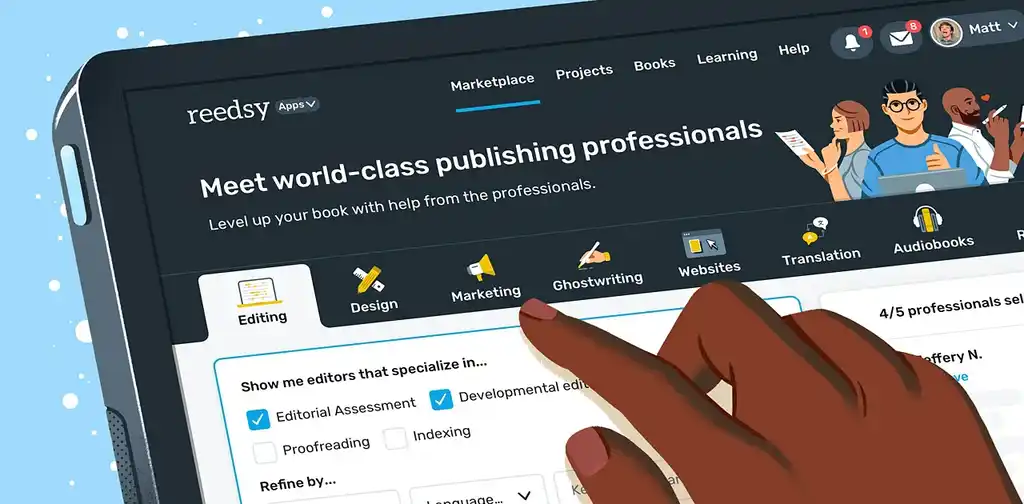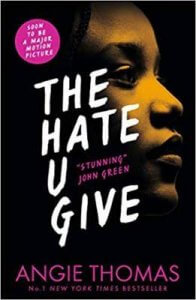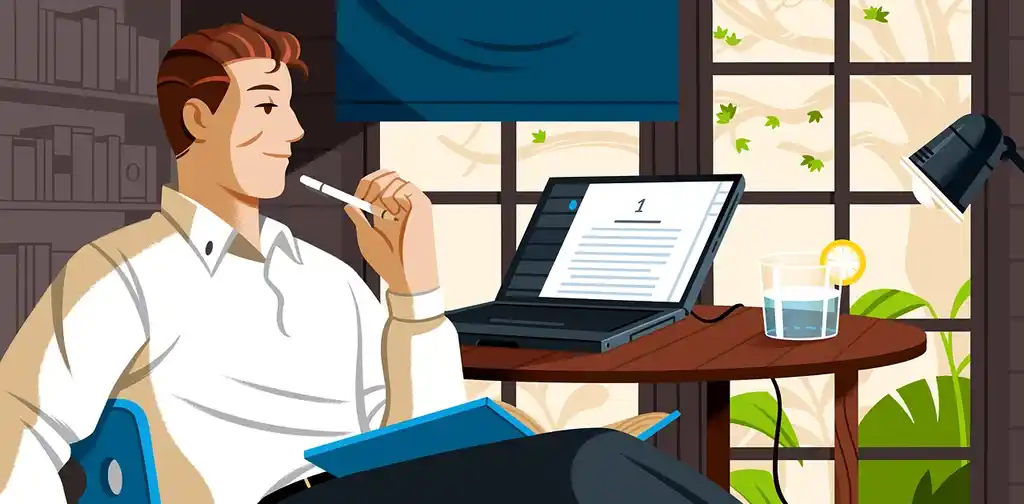Blog •
Posted on Oct 15, 2018
How to Become a Better Editor with Julie Tibbott
About the author
Reedsy's editorial team is a diverse group of industry experts devoted to helping authors write and publish beautiful books.
More about the Reedsy Editorial Team →Ricardo Fayet
Reedsy co-founder and Chief Marketing Officer, Ricardo Fayet has worked with hundreds of authors on their launches and marketing campaigns. He is the author of two bestselling guides on marketing for authors, and a regular presenter at the largest writers' conferences.
View profile →A New York City-based freelance editor and writer Julie Tibbott tells us how she stays on top of her editing game. After spending 13 years as a Senior Editor at a top publishing house, she is now a full-time freelancer who works with self-published authors.
1. Hello Julie. Tell us a little about who you are and what you do.
I’m Julie Tibbott, an editor, and writer with over 15 years of experience in the publishing business. Most recently I’ve worked as a senior editor at Houghton Mifflin Harcourt Books for Young Readers.
I am now delighting in life as a freelance editor of fiction and nonfiction for all ages, with a special affinity for speculative fiction, fantasy, historical fiction, and pop culture-focused nonfiction.
2. How did you start your editing career?
I was an English major in college, and I’d always known my goal was to work with books, reading, and writing in some capacity. The summer after my junior year, I looked for internships at book publishers in New York City and found one at a small independent publisher called Barefoot Books.
It was a wonderful place to begin my career, and not just because they published beautifully crafted books! Being in a small office, with only about ten employees at the time, I was basically everyone’s assistant — this exposed me to many sides of the business, from editorial to sales to marketing and publicity. And like all interns, I spent a lot of quality time digging through the slush pile, which was a great intro to editing!
I worked at Barefoot throughout my senior year of college, and after they moved their office to Boston, I ended up accepting a job in Scholastic’s Book Clubs division, selecting titles for their teen book club. A few years later, I moved on to Harcourt (which later became Houghton Mifflin Harcourt) and remained there for thirteen years.
3. What motivated you to become a freelancer?
To be honest, a layoff! Mergers and restructuring are common in the publishing business, and I managed to weather a few of them over the years, with my job intact. But last spring I was let go from HMH, along with many other staff members.
Although I enjoyed my job there as a senior editor, I was ready for a new opportunity and new challenges, so I welcomed the change. I had already been doing some freelance editing on the side, so I just transitioned into doing it full time.

JOIN OUR NETWORK
Supercharge your freelance career
Find projects, set your own rates, and get free resources for growing your business.
4. How do you keep your skills up? Do you have any go-to resources for editors?
For me, I read and I work. I’ve always got my “editor’s hat” on, whether I’m taking in an exhibit at a museum or reading advertising signage. I consider presentation, efficiency, and economy of language in all scenarios. I attempt to expose myself to a range of opinions and ideas, and I always try to see the story in my surroundings.
Q: What has helped you develop your editing skills the most throughout your career?
Suggested answer
Working as a sub-editor for an online news company was valuable in skills-development because it forced me to sub-edit (i.e. rearrange, rewrite, delete irrelevant material, etc.) and proofread articles very quickly to meet deadlines. Also, editing and proofreading for LexisNexis law-book publishers was valuable because it demanded a great deal of attention to detail, including many legal-specific style rules.
That kind of experience makes the usual kind of proofreading and editing relatively easy in comparison
John is available to hire on Reedsy ⏺
Following expert advice; quality training; having a variety of clients across genres; being part of a supportive network of professionals who do a good job to help stories reach their readers
Alex is available to hire on Reedsy ⏺
As for resources, I know some editors who have taken copyediting classes, but personally, I just learned by reviewing professionally copyedited materials. There's a list of proofreaders' marks in the Chicago Manual of Style that I used to refer to a lot in the early days, but eventually, I caught on! Occasionally I'll still look at the Chicago Manual, and other than that, maybe Strunk & White's The Elements of Style.
Creative writing classes and critique groups can also be helpful resources — you get to see how people respond to a variety of work, get a sense of the most effective ways to offer criticism, and learn how to polish prose. Honestly, I loved taking expository writing too, even though many more creative writers hated that class! The bottom line is that structure, clarity, and logic are always important, no matter what kind of writing you're doing.
Q: How do editors stay updated on current trends in publishing?
Suggested answer
Like any other profession, editing has its own membership organizations, publications, and conferences. I joined the Editorial Freelancers Association, Nonfiction Authors Association, and others so I can participate in the online chats and attend conferences such as Women in Publishing. Reedsy has a robust library of webinars, and don't miss their live webinars on cover critique, editing, and marketing. I read new books by industry thought leaders (notably Ricardo Fayet, Penny Sansevieri, and the University of Chicago). I attend conferences (IBPA among others). And I often take classes to sharpen my skills. Consider the NFAA's courses on publishing, marketing, and publicity. Editors need to understand the entire process from conception through writing and production, cover design, and marketing. With so much change and controversy especially around artificial intelligence, we cannot continue to do the same things without innovation and integration.
Sandra is available to hire on Reedsy ⏺
As a commercial fiction editor, I need to make sure I'm keeping up to date on the latest trends in publishing to ensure that I'm advising my clients appropriately. I do this through being a member of professional organisations like the Charted Institute of Editing and Proofreading and taking professional development courses to improve my skills as an editor, but also by ensuring I'm always aware of the current bestsellers and emerging trends and genres in the industry. It's so important for editors to understand what people are enjoying and why, so I read a lot! I keep a close eye on the bestseller charts and what is going viral on TikTok, as well as recent acquisitions in the Bookseller. I also do freelance editorial work with publishers so have a good sense of what they are acquiring and what is coming down the line!
Siân is available to hire on Reedsy ⏺
5. In your opinion, what skills are the most important for book editors?
In my view, the most important skills for an editor are taste (though that’s subjective, of course), attention to detail, curiosity, empathy, a sense of play, and the ability to make connections between a story you love and broader social/cultural movements. You need to stay informed about what social and cultural movements are happening in the world, and then be able to see how a story on your desk could appeal to culturally savvy readers.
A good example of this would be the YA novel (and soon-to-be movie) The Hate U Give by Angie Thomas. At the time that manuscript was being shopped around, the US news was inundated with stories about police officers shooting unarmed black men and boys, and activists were taking a stand against these injustices. So there was great demand for a story that touched on those timely and important themes.

Of course, not every book that relates to current events or popular culture is going to be a bestseller. But being able to make those connections, as both an author and editor, can give the story a bit more traction and help it find its audience.
6. What has changed the most about your editing process since you first started? What have you learned to focus on?
The thing that’s changed most in my process is a greater sense of clarity in prose, which comes from a lot of experience making and reviewing line and copy edits. This process really varies from one piece of writing to the next, but here are some of the elements I often see muddling prose:
- Prepositional phrases. Not that you can get away from using them completely, of course, but I often find sentences that are much clearer without prepositional phrases at the beginning or end.
- Directional words/phrases. While it’s sometimes important to know whether a character is looking or going east/west, left/right, up/down, etc., it can be dizzying and repetitive when indicated too often.
- “Looking/seeing” words. Again, you don’t want to eliminate these entirely, but I often see them overused, particularly in first person narratives. When the reader is already looking through the eyes of the narrator, it's not necessary to describe the play-by-play movement of what they see — it's enough to simply describe the scene before them. So a sentence like "In the distance, she could see the sun setting," could simply be "In the distance, the sun was setting."
- Run-on sentences. If you've got to reread that six-line sentence multiple times to grasp its meaning, then it's probably too long and rambling.
- Adverb overload. Not every sentence or dialogue tag needs one adverb, let alone multiple instances of them. I find they are best used sparingly.
Of course, style and voice also come into play when I'm deciding what to cut, so none of these are hard-and-fast "rules". But generally, any device that's used excessively is going to stand out and is worth considering cutting or changing.
7. What does your editing process look like?
My process begins with reading a hard copy of the manuscript, editing the text, and making any notes that occur to me as I go along. When that’s finished, I sit down to key in the edits on an electronic copy of the manuscript — which basically means reading the manuscript again. At this time, having a better sense of the full scope of the story, I reconsider some of my edits and notes and only include the ones that are most applicable.
At the same time as I key in these edits, I create a document to record notes and passages from the manuscript, which will be transformed into an editorial memo for the author. Keying in the edits usually takes at least a couple of days, and the memo (usually 5-7 pages) takes me a full day to craft. I’ll often then have a follow-up phone call or messages with clients later on, after they are finished reviewing my edits and notes. This is when we analyze problem spots in more detail and discuss next steps.
8. When deciding whether to take on a project, what do you look at?
I try to only work on stories/writing I actually enjoy reading, because I think you need to have some affection or affinity for the work in order to provide valuable feedback. Generally, I will not edit work by children — but not because I don’t think kids can be great writers! Having reviewed work by many young writers, I believe their time and resources are better spent simply writing, reading, and learning during those formative years. Chances are, if they stick with it, they’ll gain a lot more from a professional edit sometime in the future.
Q: How do you decide which projects to take on?
Suggested answer
Okay, I'm going to pull back the curtain on this one: I test prospective clients.
In our initial discussions, I ask a lot of questions, and with a dual goal:
- To get more information and help focus on how, if at all, I can help.
- To find out how much a writer is willing to share their thoughts and goals. Some just can't seem to be bothered to answer questions about their goals; they just seem to want what they want. I can't help these people.
There's a cliché adage that's never lost its potency: you can lead a horse to water, but you can't make him drink.
That is so true for writers who don't know what they're doing, but insist on controlling the narrative.
I help the writers who want and need it.
And there's a twist to that last sentence: some writers don't need the help they think they want, and we discuss this at length. A really good writer (and that is the most important qualification) may be looking for validation from me, but the best validation comes from the literary agent who thinks she/he can sell the book and/or the publisher who agrees to buy the book.
Others writers might simply need somebody more appropriate than me, and I share my reasons for encouraging them to look elsewhere.
In short, I only take on clients I think I can help.
Lee is available to hire on Reedsy ⏺
I always choose projects that are aligned with my editorial experience. It's very important that I feel I can provide a good service for authors and to give them useful and constructive feedback, so sometimes, even though I'm really exicted about a book, I know it's not the right fit for me and I decline the work. I am always excited to hear about new projects, and I love it when an author's passion and talent are clear in their brief.
Alice is available to hire on Reedsy ⏺
You might be surprised to know that the quality of writing and the story/character plots are sometimes secondary to my "read" of a writer's personality. I prefer working on a project that needs considerable work, and with a writer who's open to working with me, than a brilliantly written book and an author who's ego is wrapped around it... and ultimately resists any suggestions re: edits/revisions. For me, editing, like writing, is hard work... and joyful. When that joy is quashed, it becomes a labor... rather than a labor of love!
Victoria is available to hire on Reedsy ⏺
9. Do you have any strategies or tricks you use to improve your editing process?
I find reading poetry is a good way to reset after working with prose, and to get a sense of rhythm and impressionistic description, which can really benefit the editing process. Listening to music and writing songs can also provide this sort of insight. Honestly, what teaches and informs my editing process the most is simply absorbing a wide range of art, and really thinking over and discussing how and why it’s done the way it is.
10. What are some techniques you find useful when editing?
Sometimes I’ll read dialogue or certain other passages out loud to see if it sounds natural. One of my heroes is Twilight Zone writer/creator Rod Serling, who said, “Every writer is a frustrated actor who recites his lines in the hidden auditorium of his skull.” And I do believe that keeping the audience in mind is critical, so this resonates with me.
Also, when I notice a lot of repetition of certain words or phrases in a manuscript, I’ll highlight them and change or eliminate them in the edit, to ensure that there’s enough variation in the language.
11. Do you stick to a reading diet?
I have no strict “reading diet,” though I will admit to reading too little recent fiction simply because I spend so much time reading for work. I tend to read a lot of long-form nonfiction stories (from the New Yorker, Harper’s, etc.) because of those time constraints.
12. How do you deal with clients who see your feedback as harsh criticism and have a hard time accepting it?
The way I see it, authors are seeking me out expressly for my criticism and expertise. They aren’t paying to be coddled. I try not to be harsh or unkind, but I always try to be honest, and to tell them what I appreciate about their writing as well as what is not working, in my opinion.
Something I stress to authors is that a big part of my job is just asking questions — the same questions that will likely occur to other readers of their work. And in the end, edits are always suggestions: it’s up to the author whether or not they agree to my suggested edits, or handle it some other way. It is their work, after all.
I prefer to work with authors who have a professional attitude about the process. It can be tough not to take criticism of one’s writing too personally, but I think many authors realize that a different perspective on their story can bring growth and improvement. And if they’re hoping to become a better writer, that’s exactly what they want!
Q: How do you balance being critical while encouraging authors through your feedback?
Suggested answer
I perform editorial assessments and developmental edits and try to look for exciting and interesting spots where the author is really doing a nice job. I always start my editorial notes with what is working well, because there is always something that the author is doing well, and it's nice for authors to know what their strengths are. In my sidebar notes directly on the manuscript, I also like to highlight specific spots that are written exceptionally well also.
The reality is that there are publishing standards that readers, agents, and publishers expect to see in a book, so I try to focus on the "must-haves" as far as structure and expectations first in my comments.
Since there is a subjective element also in editing, I also encourage authors to read the comments and take on board the ones they agree with and that work for them and their book. At the end of the day, it is the author's work, and they must decide how best to navigate both positive and corrective feedback.
Melody is available to hire on Reedsy ⏺
Fortunately, this hasn't been as difficult as it may be for some; I have been a publisher in addition to being an editor in the past, and I'm used to working with writers of every personality and depth in multiple genres. I see the human being in addition to his/her/their capacity as a writer--this includes being supportive in terms of what I see in their writing as well as assuring each that certain issues in writing are common--so they shouldn't feel self-conscious. They're safe with me in working with them. In terms of delineating what I see in their work, I always do an overarching general assessment in addition to a markup; the markup is for any text-specific comments, questions, or clarifications in addition to any corrections (which as an editor I can't help proofreading), while the general assessment is where I recognize the broader talents and capacities the writer has--as well as any specific issues I see either consistently (grammar, punctuation, etc.) or in terms of plot, character, and/or narrative arc. I see us as being here to be supportive as well as professional. Writers can be vulnerable when it comes to their work--I can usually see via their communication if they are; some are just matter-of-fact, so I know I can be more blunt. Others it's about communicating in a way the writers will best understand what I'm saying. It always depends on the individual writer.
K.j. is available to hire on Reedsy ⏺
As soon as I receive a request from an author with a sample of the manuscript in question, I read it thoroughly to get a sense of their voice and their intention in writing. I "listen" deeply to it. I specialize in non-fiction and memoir, and I only edit manuscripts that are of interest to me. Often they are subjects I am keen to learn more about or study more deeply, or I sense they are valuable stories to offer to the world. This puts me in the position of being naturally interested in what they are saying, which comes through in our exchanges.
I pay special attention to honoring their unique voice and I see my work as helping to bring it forward more clearly and powerfully. All my suggestions are based on whether I understand what they are conveying, if I notice ambiguity, if I sense the reader might misunderstand something, or if the language is clunky or otherwise distracting. I provide a sample edit so they can see right away how I work. This allows them to feel how my suggestions land for them.
I also ask questions when something isn't clear to me, rather than make assumptions. Working with authors this way feels a lot like ordinary relationship—listening deeply, being curious about their perspective, and reflecting back to them what I notice so they have a mirror to gain perspective as well. It is important to me to schedule enough time to go back and forth with an author so I understand what they need, they can ask questions and rework things based on my feedback, and so forth. This process creates a sense of respect and collaboration which, in my experience, is mutually empowering.
Clelia is available to hire on Reedsy ⏺
Want to discover more interviews with publishing professionals? Head to the Reedsy Freelancer Blog.

FREE RESOURCE
The Full-Time Freelancer's Checklist
Get our guide to financial and logistical planning. Then, claim your independence.
Reviewed by Linnea Gradin
The editor-in-chief of the Reedsy Freelancer blog, Linnea is a writer and marketer with a degree from the University of Cambridge. Her focus is to provide aspiring editors and book designers with the resources to further their careers.
As the editor of Reedsy’s freelancer blog and a writer on the Reedsy team, Linnea has her hand in a bit of everything, from writing about writing, publishing, and self-publishing, to curating expert content for freelancing professionals. Working together with some of the top talent in the industry, she organizes insightful webinars, and develops resources to make publishing more accessible to writers and (aspiring) publishing professionals alike. When she’s not reading, she can be found dribbling on the football pitch, dabbling in foreign languages, or exploring the local cuisine of whatever country she happens to be in at the time.

